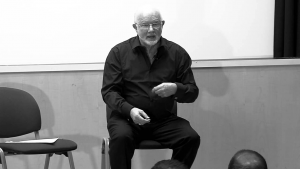Digital Download Immediately
Norman Vaughton - Epistemological Metaphors & Wounded Child Within Workshop

Norman Vaughton – Epistemological metaphors and Wounded Child Within Workshop (2008)
[Clean Language] The Wounded Child Within: deep healing work in time and space
“The past should be healed in the past.†David Grove
Epistemology is the study of knowledge; how we know something. Epistemological metaphors are the very language of our unconscious and underlie every thought and feeling we have.
When you are sad or when you are happy how do you know that you are sad or happy? There is a metaphor that contains all the history and memories associated with that particular state. It might be a deep dark hole or a bright blue sky; it could be a heavy weight or a bright shining light; it could be a bottomless pit or a shining lake, but every ‘sad’ or every ‘happy’ will be individual ideosyncratic and unique.
On this workshop you will learn how to elicit a client epistemological metaphor, to develop it and to unfold the information, history and memories it contains. During this process very often a wounded child fragment will be discovered. These wounded child fragments are not creations of the therapist but are psycho-active elements that very often underlie and precipitate the clients’ problems. You will learn ways of releasing and healing such fragments and memories.
During this process we will be learning the art of using clean language. Clean language is language that is free of the therapists’ presuppositions and expectations, that focuses directly on the information source without polluting or distorting it.
These techniques are powerful and effective even when working with major abuse and trauma. The techniques utilise naturalistic trance induction and are highly respectful of the clients’ privacy and integrity. The interventions are elegant and powerful in effecting lasting change. The techniques used are sophisticated and are at the cutting edge of information technology in the realms of NLP, psychotherapy and hypnotherapy.
The workshop will comprise of clear explanations of the underlying theory of the work we are doing, demonstrations working with participants in the workshop and also time for participants to practise using the skills themselves and mastering the techniques.
The purpose of this workshop is to provide an effective therapeutic approach to client information which has its roots in childhood trauma. During a moment of trauma, or perceived trauma, usually before the age of nine, a child looses a sense of ego boundary and becomes very permeable to experience. Words take on a very physical form and may wound; a look may pierce; an experience may become trapped in the child. Although other parts of the child’s experience continue to evolve, the trapped fragment never moves beyond the trauma. Subsequently, symptoms develop which are unsuccessful attempts by the child within to heal.
A ‘child within’ is a fragment of a child’s persona in which traumatic learning is stored and which remains ‘frozen’ at a moment in time (T-1) just before a traumatic experience. Clues to these child within symptoms are found in the rich metaphoric language, symbols and information used by the adult when experiencing physical or psychological pain. Working with both these metaphors (‘epistemological metaphors’) and the symptoms of the past enables the child within to heal her/himself – to grow through the moment of trauma (T) into a moment in time just after the worst moment (T+1).When physical or psychological symptoms are recreated in the child’s body in the past, new opportunities for successful healing are provided.
Because language for working with a wounded child within is different from that of the adult client, the therapist needs a language which will enable entry into the child’s model of the world. Part of this training includes using ‘Clean Language’, a set of questions devised by psychotherapist David Grove, that encourage metaphors, self-realisations and discoveries into being.
This workshop is suitable for anyone working with clients who:
* have experienced trauma, or have undergone sensitizing childhood experiences
* discuss symptoms and issues that have no obvious or direct causation in the present
* are resistant – a possible communication from a wounded child that a different approach is needed.
About Norman Vaughton – NLP & Therapy Specialist, Change Wizard, Psychotherapist and Hypnotherapist
Norman Vaughton spent ten years in education in the UK and was then a Headmaster and subsequently an Education Inspector in Papua New Guinea. He then retrained in Psychology, Psychotherapy and Hypnotherapy and studied in the UK, the United States and on the Continent. He was soon invited to teach with two Training Colleges and eventually became the senior lecturer with the Academy of Curative Hypnotherapy. He has conducted full training courses in Manchester, Bristol, London, Nottingham and Newcastle on Tyne. He has also taught on a regular basis in Russia and also in the Ukraine and in the United States of America. He is widely known throughout the Russian speaking world through DVDs of his seminars in Moscow.
Norman is a charismatic and exciting teacher who has a gift of making clear complex concepts. His demonstrations of techniques and interventions are impressive. It is his aim to empower participants at any of his workshops to be able to utilise the skills they have learned in their own practices with immediate effect. Ernest Rossi (author of Psychobiology of Mind-body Healing: New Concepts of Therapeutic Hypnosis) was one of Milton Erickson’s most famous students, & was one of the people who significantly developed Erickson’s work after his death. In 1998, he wrote to Norman Vaughton, “passing the torch†to him & asking him to continue developing Erickson’s work, saying “Please Norman! Take all this from meâ€
Norman Vaughton - Epistemological Metaphors & Wounded Child Within Workshop on sunlurn.com